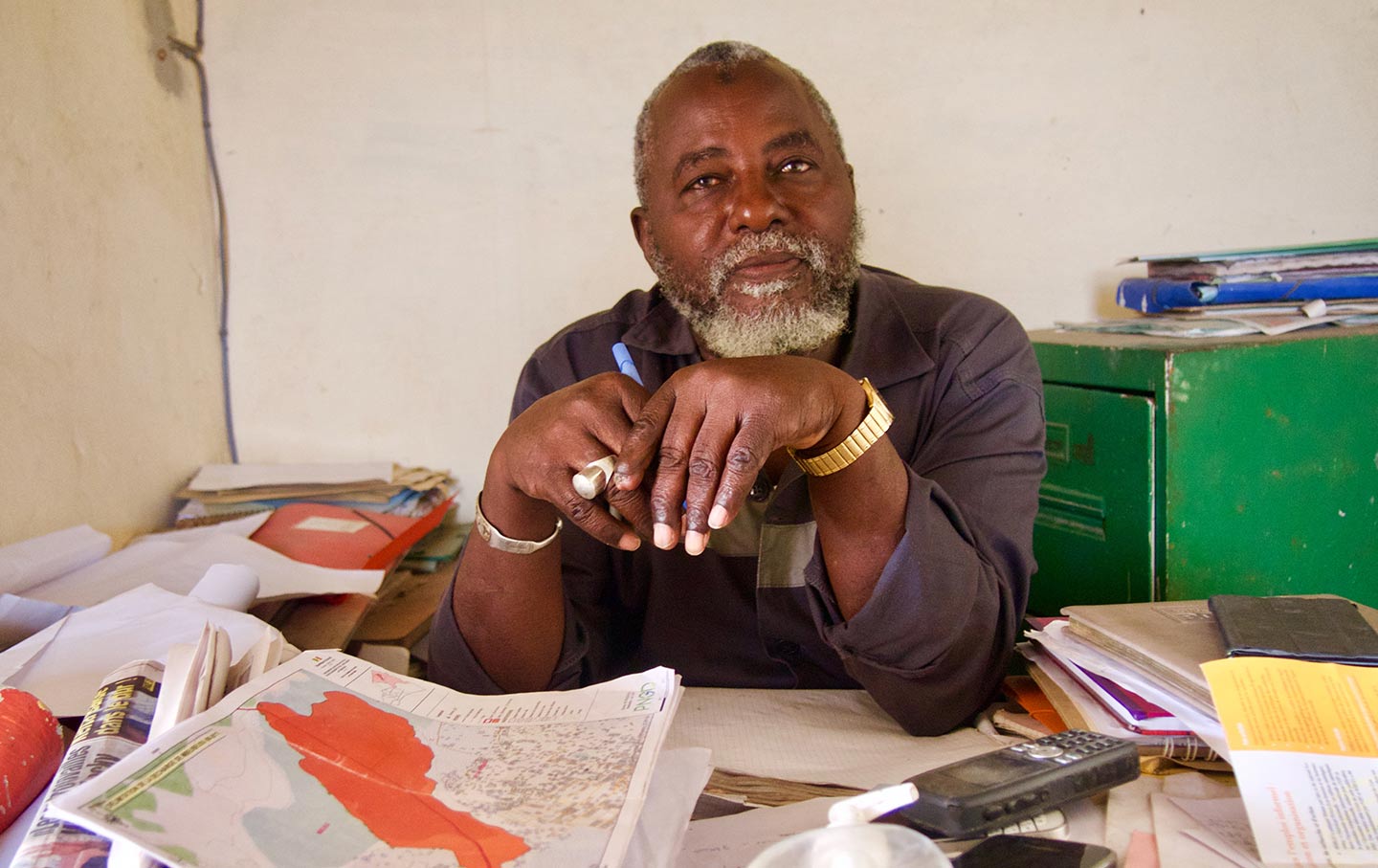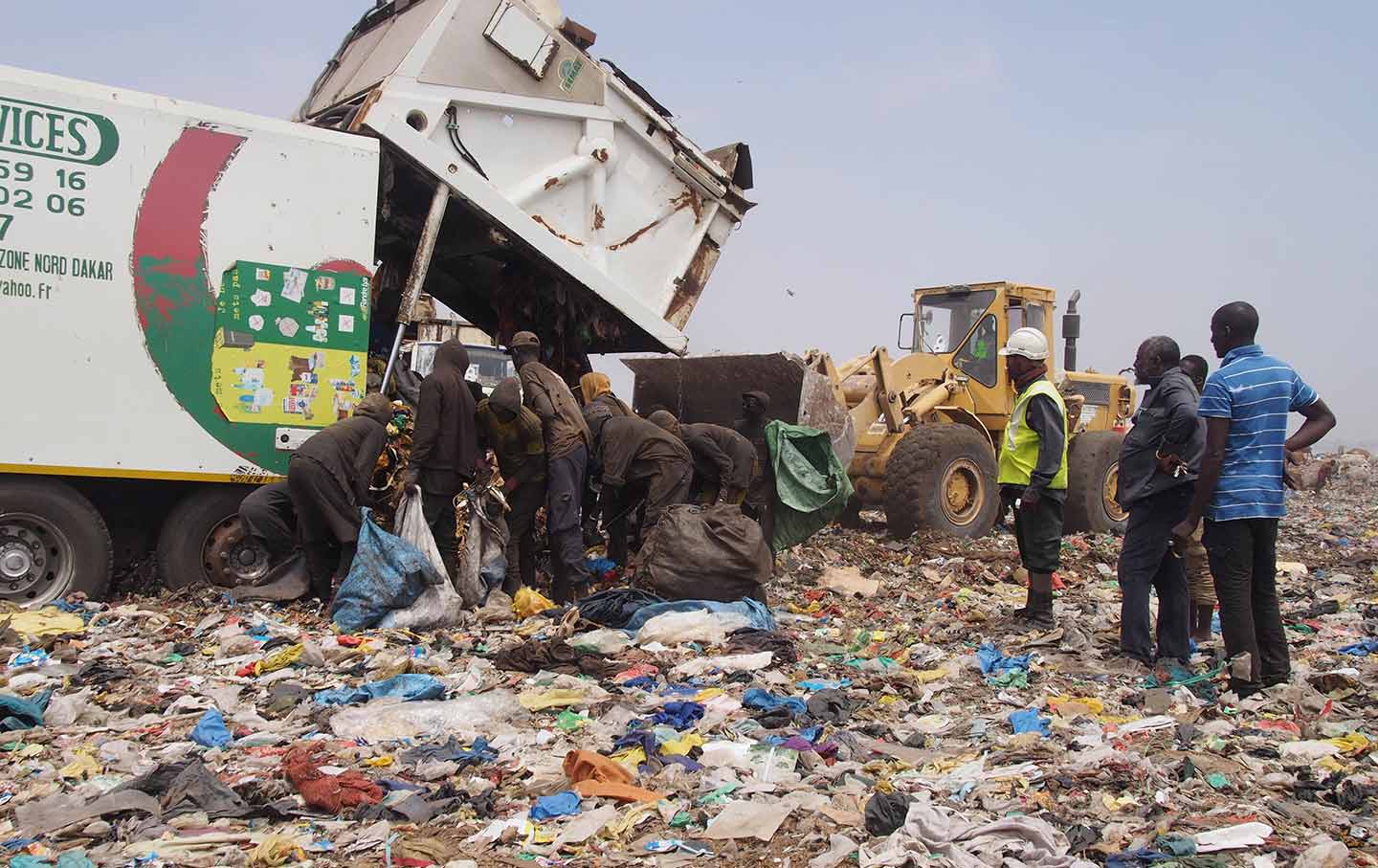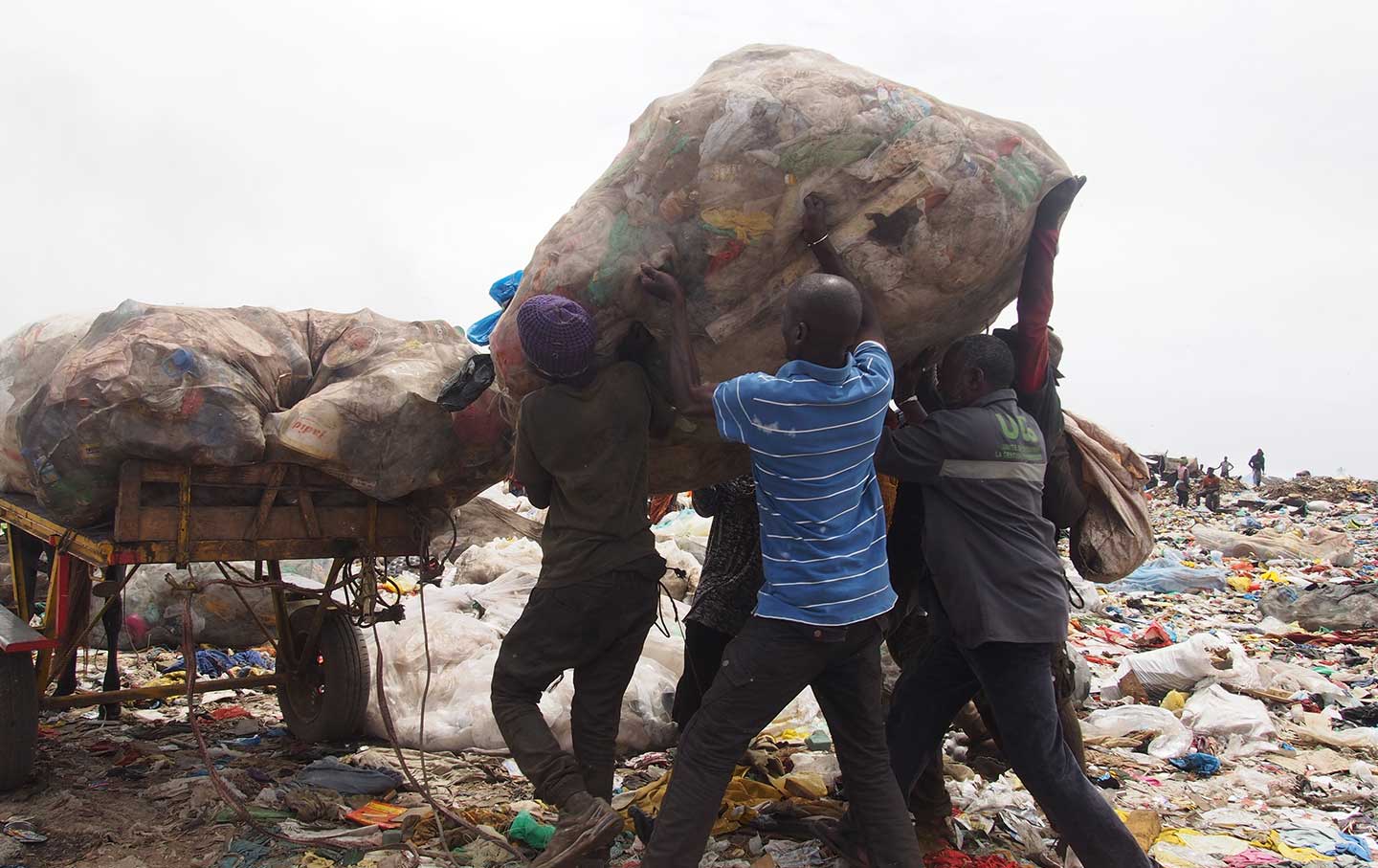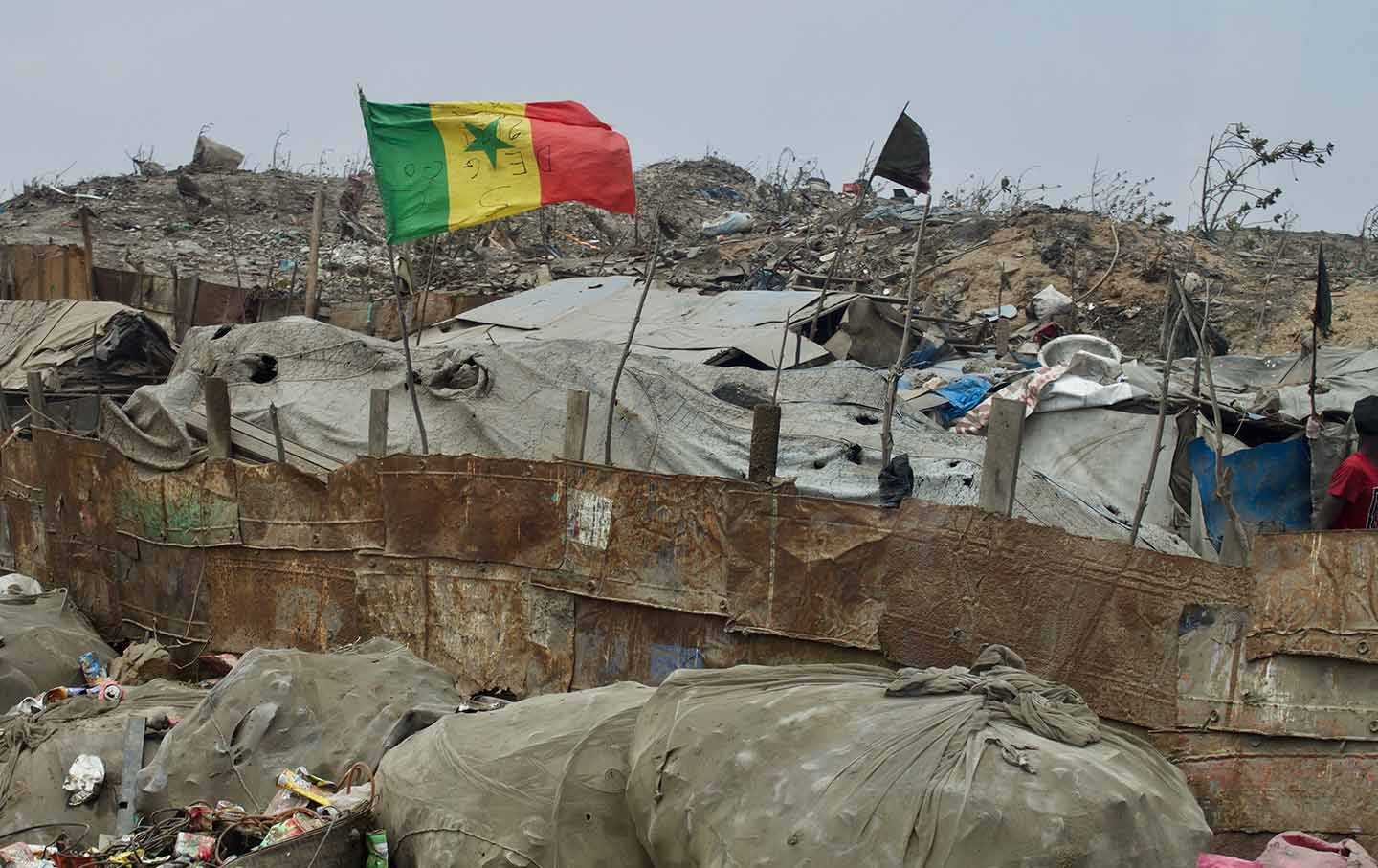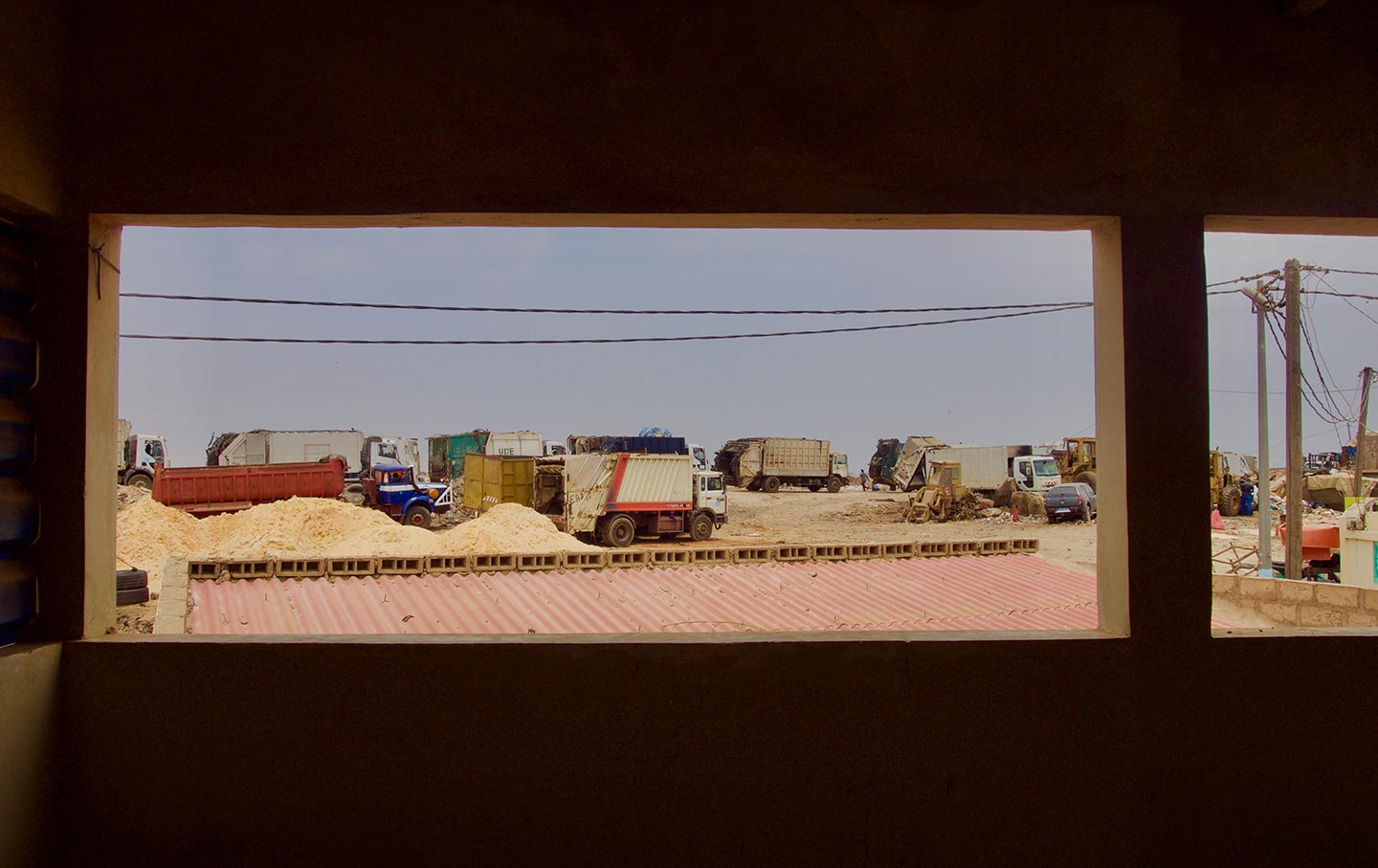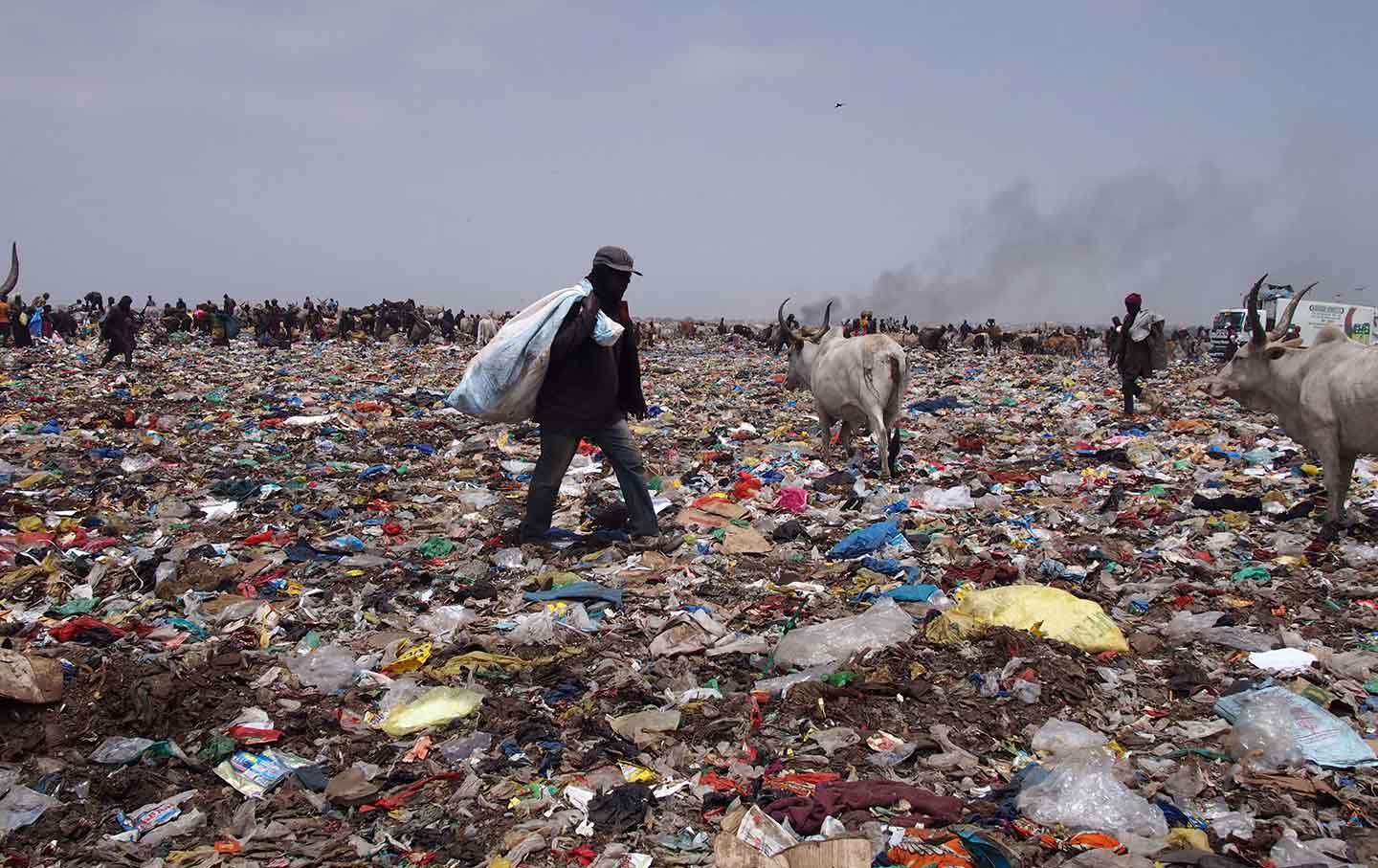The polypropylene container, or jerrican, is a familiar sight across Senegal. Savvy businessmen sell pilfered petrol from it, hawking it to drivers waiting in long queues for fuel. The women who run salons carry it to their businesses, ensuring they can still run their generators should the electricity go. It can be a vessel for water or palm oil; a child can use it as a makeshift chair. So can a saleswoman, as a weight to hold down the plastic tarp that threatens to take off. The swimming instructor ties one around his pupils; an empty jerrican makes a pretty good makeshift flotation device.
The jerrican has also become a stand-in for the idea of globalization. Because of its ubiquity and utility, West African artists often use the jerrican to symbolize the scarcity of water, the environmental effects of oil, and the prevalence of plastic waste. It’s an object that ferries across formal and informal economies, local and global, showing how tangled and indistinct those divides can be. And the jerrican is an object that accumulates by the hundreds in the Mbeubeuss dump in Dakar, Senegal.
Over the summer, I visited Mbeubeuss, the unlikely center of Senegal’s most pressing economic and political questions, where workers, politicians, international bodies and nearby neighbors debate the influence of China, the role of the World Bank, and what a modern city should look like. There, I stood in the shadows of what can only be described as a semitruck of jerricans, almost as tall as a two-story building and wider than three SUVs lined up end to end, hoping to understand what the garbage work of Senegal could tell us about waste management and its place in the West African—and global—economy.
The man standing next to the mountain of jerricans, El Hadji Malick Duallo, knows more than most people about this ecosystem. His job as waste picker, or récupérateur in French, is to cull recyclable and reusable objects from the dump in order to sell them for resale or manufacturing. Waste pickers collect and flatten aluminum cans. They wash and mend discarded T-shirts. They separate caps from bottles, rims from rubber, and sand from detritus. And they stockpile durable, plastic objects like jerricans.
When I asked Duallo about what Mbeubeuss can tell us about the economy of garbage, he interrupted my translator, Almane, in the middle of the question, shaking his head and waving his hand dismissively.
“This isn’t the trash economy of Dakar,” Duallo said, exasperated. He gestured outward toward the whole of the dump. “This is the whole economy.”
Duallo is a graying man who speaks without breaking eye contact, even when speaking Wolof to my foreign ears. I contacted him via WhatsApp through a friend of a friend, and when we met outside Mbeubeuss on a hot Monday morning in May, he was with Harouna Niasse, who provided a lanky, measured contrast to Duallo’s broad build and exuberance.
Both men are representatives of Bokk Diom, an informal union representing waste pickers at the dump, and they’d agreed to walk me through a day in the work life of a waste picker. We began in Duallo’s office inside the complex. Duallo’s desk was overrun with file folders, giving the sense that it serves a better function as a depository than as a desk; out of one of the folders, he pulled a map to show me the present-day layout of Mbeubeuss. It looked official, full of data: the kind of document an organization like the World Bank might produce.
Popular
"swipe left below to view more authors"Swipe →
Mbeubeuss sits on top of a lake by the same name. When it was originally established in the 1960s, the dump sat well outside the city limits of Dakar. Because the land was seen as disposable, it was easy to justify sending the city’s garbage to Mbeubeuss. And once the garbage was there, it reinforced the notion that the land was disposable, not dissimilar to dumps in many other corners of the world established on cheap expanses of land. Mbeubeuss thus became a dirty secret known by city officials and the Dakarois: an essential, but often invisible organ for the city center’s day-to-day functioning.
In the years since, Mbeubeuss has grown and Dakar has, too. Today, it no longer sits outside the city limits, but in the heart of a busy neighborhood. The modest lake the dump is named for is still visible in a gorge between the accumulated garbage. Mbeubeuss, Duallo explains, has its own residence, neighborhoods, and rules. It’s like any other community, with its own form of social organization, both formal and informal.
“We’re here,” he said, pointing to a blue-colored sliver jutting out labeled Gouy Goi. He explained that was the neighborhood where many of the longtime waste pickers lived. Opposite Guoy Goi is Abord, which holds one of the two designated Chinese zones where recycling factories owned and managed by the Chinese sit. Just past Abord is Baol, named for a region of Senegal and the people who reside there; it typically houses new arrivals and temporary waste pickers. Opposite that is Darou, named for Dar es Salaam, and Wembley, named for the English football stadium.
These neighborhoods all feed into Yemen, named for the country—“because it’s usually on fire,” Duallo quips. Yemen is where all incoming garbage is dumped and sorted, and it is the largest sector of Mbeubeuss.
Duallo and Niasse drove me and my translator in a garbage truck all the way to Yemen. Plumes of smoke twisted into the gray sky and cattle grazed the detritus. Around each incoming truck, groups of waste pickers, largely young men, crowded around as a slow load of garbage oozed out of the truck, nearly as compact as a shipping container. Single-use plastics like Kirène water bottles, cellophane packaging, and plastic bags from the grocery store are easy to pick from these loads, but exoskeletons of cellphones, car parts, and batteries make a better haul for a waste picker. Scrap metal is lucrative, but laborious to extract.
When we got out of the truck, the air smelled of burning rubber, manure, and sulfur. With each step, I sank into the ground, as if being swallowed by a quicksand of garbage. As we toured Yemen, Duallo approached each group of young trash collectors and asked if they belonged to the Bokk Diom union. He’s gotten good at spotting which groups are in need of his labor evangelism—like the group where a truck driver and a waste picker were shouting at each other over a dispute about where the driver chose to dump his load, a place outside the queue of trucks circling through Yemen.
Duallo stepped into the middle of the yelling men and his stern presence immediately quelled the disagreement. He chided the driver for jumping the queue, then turned toward the young waste pickers and admonished them for not being union members, since the union would’ve helped with disputes like this. The collectors averted their eyes like chastened children.
Bokk Diom has 4,000 registered union members who pay an annual membership fee of 1,000 CFA, or $1.75. The union is associated with a labor NGO called Women in Informal Employment Globalizing and Organizing, or WIEGO. (Women are not mandatory for inclusion though women play an important role at Mbeubeuss. The week I was there, the women union members were busy meeting with Naomi Campbell.)
If Duallo seems particularly strident about the union, it’s because of the precedent set by their brethren, the country’s garbage collectors, whose labor force developed out of a youth movement to clean up Dakar. Their union has been a politically powerful force and has not only won better wages and contracts, but also organized some of the most effective demonstrations against President Wade.
Duallo wants that same political influence for waste pickers, too. They deserve it: Recycling is labor-intensive work that requires specialized knowledge of materials. And the materials they recycle are foundational to the manufacturing sector in Senegal. The waste management industry exists at the intersection of negotiations between business leaders, nongovernmental organizations, municipal and national governments, and unions: another frontier of globalization on the African continent where value extraction has defined more than a few centuries of the continent’s relationship with the rest of the world.
“Privatization projects tend to be part of an economic process of identifying the value of this work,” says Rosalind Fredericks, an associate professor at NYU who studies urban citizenship and waste infrastructure in Senegal. “The value that has been created over decades by recyclers gets co-opted by the state, then all of a sudden the literal money and the recycling networks come into view for the state and the state wants to capitalize on the value of recycling that has been developed by these pickers.”
What’s more, waste picking is dangerous work involving exposure to toxic materials and few worker protections. Last summer, a boy died after falling into a toxic waste deposit outside one of the Chinese factories that collect and industrially wash the materials before preparing them for shipping to manufacturers both within the country and abroad. But attempts to protect the workers through restructuring and technological upgrades can make their livelihoods far more precarious. That’s because many private companies assume that workers are nonessential to the dump and promote solutions that deprive workers of their livelihoods. If any attempt is made to include them in these efforts, it’s typically on humanitarian grounds, not on the basis of their expertise as workers.
In fact, workers like Duallo are pivotal to the operations within the dump at Mbeubeuss. While their work may have a manual component, they also perform knowledge work not entirely dissimilar to a stockbroker’s. “A picker on the dump pointed out to me that it was like the stock market in that it is incredibly sensitive to the fluctuations in the global currency markets,” Fredericks says. “When the price of copper or iron or gold changes, it’s immediately felt in the dump.”
Dumps like Mbeubeuss in Senegal are an instructive study in what is at stake when we envision the future of garbage.
In the summer of 2017, China announced that it would ban the import of plastic waste to its shores. The policy inspired a deluge of news coverage about the plastic produced by American consumption and how it was dumped all the world over. These stories discussed the global implications of this policy, but many failed to acknowledge the sheer size and scope of waste dumping as an industry—measured not in symbolic objects like jerricans but in dollars, by the billions—and the inevitable fluctuations that come with pricing in a global economy. During the 2008 market crash, for instance, prices for paper, plastic, copper, and tin—all materials typically recycled from dumps like Mbeubeuss—dropped by at least 30 percent. The recycling industry largely collapsed as a result of the declining price of these raw materials, which were essential to manufacturing in China.
In one dump in Soweto, South Africa, that scholar Melanie Samson studied over a three-week period in October 2008, the global price for scrap metals dropped by two thirds. At that time, it took about three months for shipments of recycled commodities from South Africa to reach China, so many of these shipments were en route during the price drop. When their depreciated goods reached China, buyers refused to accept the shipment. As a result, many of the middlemen who bought paper, plastic, and scrap metal from the waste pickers left the dump. Those who remained dramatically cut their rates, meaning that the waste pickers absorbed most of the fall in prices as these middlemen maintained their profit margin.
This challenges a familiar story about garbage, in which trash becomes a facile metaphor for global inequalities between the haves and have-nots. In this narrative, the exurbs of the Global South are unwitting recipients of the waste produced by the excessive consumption of the Global North; where the supply chain has a clean beginning and end for each object from production to landfill; and in which the people fated to sort through that garbage, like the waste pickers of Mbeubeuss, are powerless victims of globalization, a provincial and doomed lumpenproletariat. This is the narrative undergirding documentaries like Trashed and Plastic China.
“The prevailing narrative around waste dumping never gets beyond investigating even the most basic surface economies of how much it costs to get the stuff from point A to point B,” says Josh Lepawsky, professor of geography at Memorial University and author of Reassembling Rubbish. “The assumption is usually just made that because it’s going from so-called developed countries to developing countries, it must be because it’s cheaper there,” Lepawsky says. “But when you look at things like landfilling costs and shipping costs, it’d be cheaper to not ship our waste away. So why spend all that money to send it away if it’s just cheaper to send it to a landfill here?”
The main reason garbage is exported out of America is because someone outside of America is buying it. Usually, they are expecting that they will be able to make enough money from the waste to recover the cost of shipping that they paid. And the reason they are expecting that is because much of what we waste is recoverable and sellable: At Mbeubeuss, plastic and copper are among the most popular materials separated and sold.
“It’s important to step back a little bit from waste as a universal category,” Lepawsky says, meaning that it’s important to interrogate what is classified as “waste” in the economy.
For consumers, waste seems like an easy category to conceptualize because we are used to throwing certain items in the can: Chobani containers, Starbucks straws, empty toilet paper rolls. We might widen our perception of our personal waste footprint to extend beyond that to include our old flip phones, the car battery we replaced, or the couches we left out on the curb. And it is true that the richer you are, the more garbage you are likely to produce. But most waste is produced by industrial production. So waste management often is encompassing a wider category of waste than we might see in our recycling bin, such as chemical byproducts.
“Certainly, waste management companies deal with the infrastructure those bins feed into, but they are very much in the business of materials management more broadly,” Lepawsky says. “And the switch in concepts is important, because they’re looking for any way possible to rekindle value in what you and I are getting rid of as waste.”
This rekindling speaks to a whole economy of reuse and resell that is bound up in our usual metrics of imports and exports, which we don’t typically expect to include trash. This drives the transfer of consumer goods like textiles and LCD-TVs trafficked across borders, as well as the sale of raw materials necessary for manufacturing like steel, copper, aluminum, and various types of plastic.
Almost a billion tons of waste are turned back into commodities each year, according to the World Waste Survey. China’s ban on imported plastics has increased the pressure on landfills in countries like Malaysia, Indonesia, and Vietnam to receive the 7 million tons of waste that China used to import. But outside of Southeast Asia, China’s policy is also introducing dumps like Mbeubeuss to further global business opportunities: to not only sell what they recycle to foreign businesses, but to import from them too.
Today, waste management is a $330 billion industry. In the next five years, it’s expected to grow to a half-trillion-dollar industry. Most of that growth is predicted to come from Africa, where population growth, urbanization, and industrialization will all contribute to the sector’s expansion, as both consumption and manufacturing are expected to rise.
Though the recycling industry has rebounded since 2008, the specter of global recession and China’s influence still loom large over Mbeubeuss. There are two Chinese-owned factories on the premises that process recycled materials, acting as middlemen between the waste pickers of Mbeubeuss and the manufacturers who purchase their commodities. There used to be other businesses, from India, but they were edged out.
Without the competition, Duallo laments that it is a lot harder for the workers to negotiate better compensation for their recycled goods, and he worries about their ability to absorb any future market dips like the workers in Soweto. This is why the union is so important to representing their interests, he says.
“Sometimes the middlemen don’t pay on time. And they give you a slip of paper promising to pay you later, but then they will pay you the worst price if the price has gone down. But they won’t pay you the better price if the price has gone up.”
But China’s policy isn’t the only outside force transforming the future of waste picking in Senegal. Right now, the World Bank is working to upgrade the waste management infrastructure of Senegal, and Mbeubeuss is their guinea pig.
Forty kilometers away from Mbeubeuss is Diamniadio Lake City, a “futuristic township” that expands the reach of Dakar inland. The city is the hallmark project of current president Macky Sally, who came into office in part through the support of the union of garbage collectors.
CGC Overseas Construction Group, a Chinese firm, has poured millions of dollars into the new city. Diamniado’s promotional material promises new skyscrapers and sports arenas, as well as office and factory spaces for foreign businesses like C&H Garments. It’s supposed to be a vision of the modernity of the city and its connections to the global economy.
Part of the project includes a new toll road connecting greater Dakar to the new city and its adjacent airport. In 2009, the World Bank sponsored the highway and, as part of its plan, it proposed the closing of Mbeubeuss, which was just two kilometers away from the highway. The World Bank proposed moving all landfill activities to Sindia, over 60 kilometers away.
Both the workers of Mbeubeuss and the residents of Sindia mobilized to stop this project. And so the World Bank pulled back from its plans to close Mbeubeuss. In their report, it admitted that the workers’ mobilizing played a role in the pullback, but wrote, “Mbeubeuss still poses a health risk for the whole city hence the desire of the Government to close it.”
“The 2009 World Bank project failed to close Mbeubeuss for a number of reasons,” Fredericks says. “The new site [in Sindia] was sabotaged by the locals there who didn’t want the dump. But also, the waste pickers were already organized because of Bokk Diom, so they could resist the closing of Mbeubeuss.”
Ten years later, the World Bank has set its sights on Mbeubeuss again, this time as part of a countrywide project to upgrade waste management systems.
The World Bank has declined to participate in this article, despite multiple requests and ongoing e-mail correspondence. The project is still in process and includes input from workers at Mbeubeuss. The full plan will not be released until 2020. Workers and others participating in the project declined to comment, citing their non-disclosure agreements. All anyone will say is that the goal is not to close Mbeubeuss but to “upgrade” it.
The fear among locals is that the World Bank will bring in middle managers with little knowledge of the dump to run new facilities and prescribe closing parts of the dump, disrupting the fragile but functional economy that so many workers rely on.
“I think Mbeubeuss has come onto the radar of state agencies and state interlocutors who are responsible for managing the future of the city, because it is seen as a blight on the city’s modernity and on its future,” Fredericks says. “I think the state might be opposed to quantifying, really rendering legible the size of this economy. They are often inclined to make it seem really small, like this is kind of niche.”
As I rode in a truck through the neighborhoods of the dump, I began memorizing a litany of the garbage that I saw. Plastic lawn chairs. Kerosene containers. Neon-blue fishing nets. Cans for tomatoes. Sachets for feminine sanitary wipes. Liter water bottles. Apple cores. Uncooked rice. Chicken bones. Cans flattened by the wheels of garbage trucks. Sand and soil, too. Tires. Umbrellas. Plastic bags. Glass bottles. Sweatpants. Dangote cement bags. Headless dolls. Postcards. Tarps. Car frames. Illicit medical waste: tubes, needles and stained gowns.
At one point, likely testing the extent to which I would resist visibly squirming, Duallo picked up a half-eaten chicken wing and offered it to me. After my eyes widened and I mentally calculated the extent to which he was serious, Duallo laughed and threw the chicken wing back to the ground.
“American,” he teased.
In his office, I sat on plastic lawn chairs that he claimed were donated by a factory who bought its plastic from Mbeubeuss. Before the midday call to prayer, he washed his hands and feet with a plastic kettle full of water, pointing out that the kettle was also manufactured from their recycled plastic.
Mbeubeuss seems like a world of objects that fill the gaps in everyday life: the plastic sleeve for Indomie, the flip-flop, the Happy Meal toy.
But Mbeubeuss is also a world of workers who turn what is discarded back into valuable commodities. And at a time when the waste management industry seems poised to grow, this labor is both incredibly valuable and highly precarious.
“I want an association for all of West Africa,” Duallo says, raising his fist. He said that efforts to unionize at the dump were not enough given that manufacturing in Africa relied heavily on their efforts. “Eighty percent of products for factories come from waste, so we must advocate for our value.”
Eighty percent is not a hyperbolic nor implausible guess. According to Lepawsky, Fredericks, and other scholars in the field of discard studies, it is difficult to know exactly how much raw material for factories in the region come from recycled waste, but, to them, Duallo’s figure accurately reflects the extent to which the waste management economy is bound up with the rest of the global economy.
Adam Minter, a journalist who covers scrap recycling, writes that the global recycling industry turns over $500 billion annually. The recycling industry bridges production and consumption. “It’s a canary in the coalmine: It’s the front and back end of industry,” Minter has said.
Dumps in the Global South are often depicted in television documentaries as the end of the capitalist economy, “a toxic graveyard” “where technology goes to die,” but like an ouroboros, Mbeubeuss is also where the economy begins. Through institutions like the World Bank and foreign businesses like CGC Overseas Group of China, money will keep pouring into Senegal to support development projects that give Dakar a veneer of modernity—a veneer that can seem incompatible with the grime and grit of Mbeubeuss. But the attention paid by the Senegalese government, Chinese businesses, and the World Bank to Mbeubeuss proves not just its importance to the city but also its economic strength, at exactly the moment the city wants to clean it up.
If Mbeubeuss could provide a potted narrative about the global economy, what story would it tell? It would tell the story of how under global capitalism, value can be mined from anywhere, even trash; of Chinese businesses’ becoming Africa’s largest trading partner, buttressed by the export of minerals, metals, and byproducts culled from waste; of how “development”-oriented projects promote technocratic solutions at the expense of workers.
But it would also tell the story of the persistence of organized labor and the possibility for workers to define their own fate.
A few days after my visit to Mbeubeuss, I drove on the new toll road, passing Diamniadio on my way to the airport. The new city reminded me of so many like it in the region: company names illuminated against the night sky, buildings a carbon copy of commercial office parks. These big investment projects purport to be the dreams of globalization made concrete. But Mbeubeuss seemed like a better embodiment of those ideals. The gritty, skilled work of recycling and resell encompassed both the materiality of the global economy and its rapid relays of value charted through exchange. It wasn’t just the garbage economy; it was the whole economy, just as Duallo promised.

